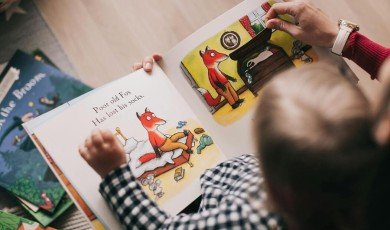
In the earliest years of life, children absorb information at a pace that seems almost unbelievable. Every sound, colour, word, movement and expression becomes part of a foundation that will shape how they think, communicate, solve problems and relate to others. Early learning isn’t just preparation for school — it’s the blueprint for future abilities. Understanding how this process works helps parents, teachers and entire communities support children in ways that have a lasting impact.
From the moment a child is born, the brain begins forming connections at extraordinary speed. Scientists often describe the early years as a “window of opportunity,” a period during which the brain is highly responsive to experiences. What children see, hear and feel during this time influences how they develop skills that will define much of their adult life.
Why Early Learning Matters More Than We Realise
Many people assume learning begins when a child starts school, but the truth is that education starts long before formal lessons. Infants begin recognising patterns and reacting to stimuli within days of birth. By the time they turn three, they have already built millions of neural pathways that lay the groundwork for language, emotional control, creativity and logical thinking.
Early experiences shape these pathways. Positive, stimulating interactions encourage stronger, more efficient connections; neglect or lack of engagement can slow the development process. This doesn’t mean early childhood must be a rigid or overly structured environment — quite the opposite. Children learn best through warmth, play, safety and exploration. But the common thread is clear: early learning builds the pillars of future success. Every conversation, picture book, outdoor walk or imaginative game contributes to cognitive growth that lasts long beyond childhood.
The Role of Language and Communication in Early Skill Development
Language is one of the most powerful tools a child acquires early in life. Even before they speak, infants are attentive listeners, absorbing the rhythm and structure of conversations. When adults read to children, narrate daily routines or respond to early attempts at communication, they help build linguistic skills that influence academic performance years later.
Strong early language development plays a role in:
-
reading comprehension
-
social interaction
-
problem-solving
-
confidence and emotional expression
Children who grow up in environments rich in conversation and storytelling often show higher levels of curiosity and adaptability. This is particularly important in multicultural families or environments where multiple languages are spoken. Exposure to diverse linguistic patterns enhances cognitive flexibility and strengthens memory.
Interestingly, this mirrors certain professional fields where accuracy in language matters deeply — for instance, companies offering certified translation services uk rely on precise understanding of multilingual communication. This connection highlights how linguistic foundations built in childhood can influence the ability to communicate clearly and think critically later in life.
The Power of Play in Long-Term Development
Play is far more valuable than many people realise. It’s not just entertainment — it is the essential engine of childhood learning. Through play, children test boundaries, develop motor skills, practice social interactions, explore creativity and learn emotional regulation.
Different types of play contribute to different skills:
-
Imaginative play strengthens creativity and storytelling.
-
Physical play develops coordination, strength and spatial awareness.
-
Cooperative play builds leadership, empathy and teamwork.
-
Constructive play enhances problem-solving and persistence.
These early experiences help children become adults who can collaborate, innovate and adapt — traits highly valued in the modern world.
The power of play becomes even more evident in environments where children are encouraged to take small risks, experiment freely and solve conflicts with guidance rather than pressure. This nurtures resilience, flexibility and independence.
Social and Emotional Learning: The Heart of Future Success
In addition to cognitive abilities, early childhood is when children develop emotional intelligence. They learn to recognise their own emotions, manage frustration, express needs and understand the feelings of others. These skills have a profound influence on future relationships, mental health and academic success.
Supportive adults help children make sense of emotions by:
-
validating feelings
-
modelling calm behaviour
-
teaching boundaries
-
offering comfort and guidance
Research consistently shows that emotional security in early life is strongly linked to self-confidence, motivation and long-term well-being. A child who feels seen and supported becomes an adult who can manage stress, communicate effectively and work through challenges.
The Environment Shapes the Learner
Children’s environments — physical, emotional and social — deeply influence how they learn. A stimulating environment filled with books, colours, music, conversation and exploration opportunities encourages curiosity. Stable routines build confidence. Safe relationships provide the emotional grounding needed to take risks and grow.
Even cultural exposure plays a role. Children raised in multicultural environments often show greater adaptability and broader thinking. This becomes invaluable in a world where global communication and cross-cultural understanding are increasingly important. It’s the same principle that drives the need for accurate international communication in global industries such as legal, medical or business translation, where organisations frequently rely on certified translation services uk to ensure clarity and compliance. The better a child understands the world, the more confidently they can navigate it.
How Early Learning Shapes the Child — and the Adult
What children learn before the age of six lays the foundation for:
-
academic performance
-
emotional stability
-
problem-solving skills
-
social communication
-
resilience
-
creativity
-
decision-making
Early learning doesn’t determine a child’s destiny, but it shapes the pathways that make future learning easier or harder. When children are supported, stimulated and encouraged, they develop the tools they need not only to succeed academically, but to thrive as thoughtful, capable human beings.
Early Learning Is a Long-Term Investment
Early learning is not a trend or a theory, it is one of the strongest predictors of future success. It shapes a child’s brain, influences their personality, strengthens their emotional resilience and builds the foundation for lifelong curiosity. The earlier we support children, the more opportunities they have to grow into confident, capable adults.
Investing in early childhood means investing in the future — not just of one child, but of entire communities.
Most Read
Featured Posts

Why Creative Play Boosts Kids’ Brain Development






